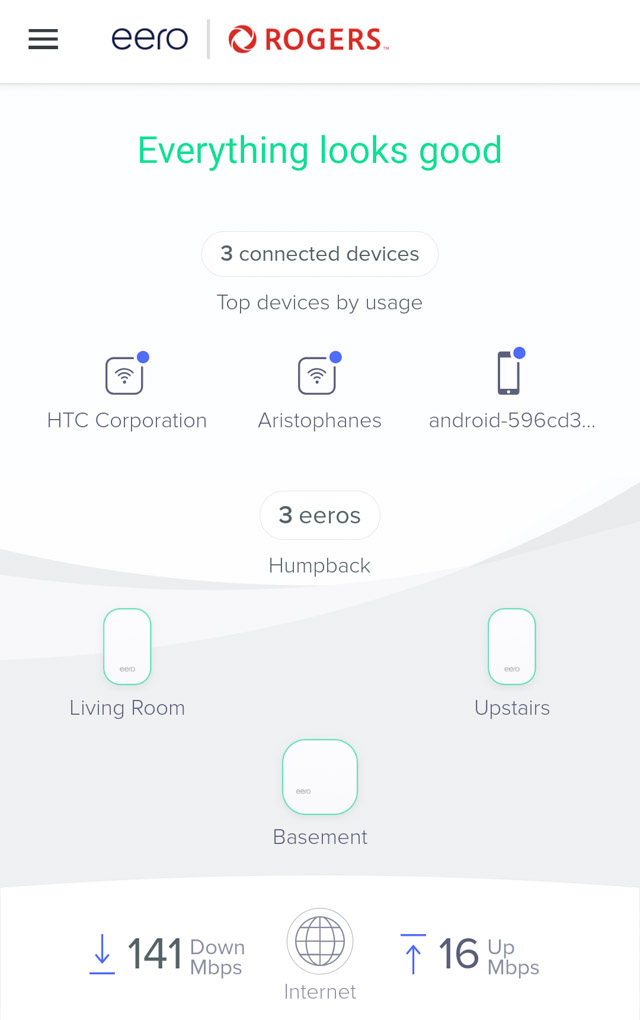
2019 Networking Snapshot

Home networking, I mean, and by phone. Hasn’t been on my mind much, because it’s generally been good enough. But for a variety of reasons I got an Eero WiFi setup and so now I have to think about it.
What happened was, our ISP sent us a note saying “We upped your data from 150Mbps to 300.” Our home infrastructure features Cat5 installed in the last century and an old Apple Time Capsule, none of us remember when we got it. Also, we’d like the new Jaguar to get enough WiFi out in the carport to do downloads.
Wirecutter and a couple of other sites liked the Eero (I was a little surprised that the Google offering isn’t terribly competitive). Because of the car, I bought a three-box configuration although our house could probably get by with two.
On Eero generally · Haven’t had it long enough to say anything about reliability or trouble-shooting, but… what a fabulous onboarding experience. The time it took to get all three boxes live on the air was dominated by the physical unboxing. My employer is acquiring Eero and I think we should immediately double the comp of their UX people then install them in glamorous corner offices. AWS is getting better at UX, but this is next-level stuff.
Here’s the front page of their Android app.
The only real flaw is their assumption that my cellphone ISP (the Rogers up at the top) is the same company as our home ISP, which it isn’t. Amusingly, of the three devices listed, “HTC Corporation” is my Pixel 2, “Aristophanes” is the 2014 MacBook Pro I’m writing this on, and “android-…” is my son’s beat-up old Motorola. The network’s name is “Humpback” because the one it’s replacing was “Orca”.
Down at the bottom, the performance numbers are where it gets interesting. Our ISP says we’re getting 300M, but this is peak evening time, someone’s streaming something on the TV and my son’s playing Apex Legends, and I bet similar things are happening at houses all over our local cable loop. It turns out the Eero runs network speed tests regularly, and keeps a log.
You can see that at 5:30PM when everyone’s cooking dinner and commuting, we were actually getting the 300M the ISP claims. [Late update: It’s 11pm now and Eero says we’re getting 330 down.]
How fast? · Now, it’s not as if that 300M reaches the living room. If I go downstairs and stand near the base modem, I’ve seen as high as 280M on Speedtest.net, but I’ve never seen anything over 150 up where we live. I haven’t cared enough yet to experiment with placement. And the old Mac Pro, wired through the old Time Capsule and another switch in the basement to the cable modem, never gets near 100. I suppose I should be unsatisfied with 150 down, 15-or-so up?
And of course these days, when I’m out and about and my phone says “LTE+” up in the status bar, which it does in most civilized places, Speedtest claims to be getting 90+ down and 30 or so up. Which makes me wonder why WiFi is better. Having said that, in Canada we have a rent-seeking telecoms cartel that rakes in among the highest per-gig mobile data prices in the world.
Good news: The car gets solid WiFi out back.
What does this all mean? As an old guy, these bandwidths feel absurdly high. The blockages and slowdowns we occasionally encounter aren’t here, they’re Out There on the Net somewhere.
I do have a question, though: What in freaking hell is 5G going to offer that’ll motivate us all to lash out for new mobiles and services that’ll pay back the titanic investment it’ll take to offer it? Beats the hellouta me.
Comment feed for ongoing:
From: orcmid (May 02 2019, at 11:09)
Isn't the slow wired speed because of the Ethernet adapter running at 100 Mbps? Even if you have a Gigabit household router?
[link]
From: Sutha Kamal (May 16 2019, at 11:53)
5G reduces latency to <5ms to the network. All of a sudden, compute intensive tasks (better done in a a datacenter either because of power efficiency or hardware availability) can run in the cloud, and not your device. Makes applications like high visual fidelity AR possible when you can offload most of the work off-device, and not have to carry an enormous battery around.
In any case, in general I imagine the perceived benefits from 5G will come from its latency reduction more than bandwidth increase.
[link]